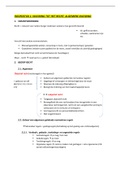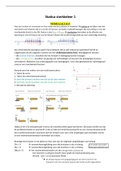fundamentals of ethics)
Week 1
Hedonism
Hedonism is the view that:
The only thing that intrinsically enhances a person’s well-being is happiness, and the only thing that
intrinsically diminishes a person’s well-being is unhappiness.
Advantages:
- The claim that happiness improves a person’s life is very plausible.
- Hedonism can explain why diferent kinds of lives can be good for the people living them.
Disadvantages :
- What if happiness is based on false beliefs?
- What if happiness results from manipulaton or coercion?
- Is a life with a downwards happiness-trajectory as good as a life with an upwards trajectory?
Fred Feldman: The good life
- Interested in the queston what makes a life good for the person living it.
- Defends a version of hedonism, which he loosely describes as the view that ‘what makes a
person’s life go well is that he enjoys what he gets’.
- Pleasure as a feeling vs pleasure as an attude
- Some people think of pleasure as a bodily feeling or sensaton (“sensory pleasure”).
- Feldman says that sensory pleasures are feelings that we typically like.
- Feelings have a felt quality, and (typically) a locaton.
- In Feldman’s view, the kind of pleasure relevant to well-being is attudinal pleasure.
Attudinal pleasure is distnct from sensory pleasure in that it has no obvious locaton and
takes a state of afairs as object. It is pleasure taken in some (presumed) fact or state of
afairs (such as the fact that the lecture is interestng).
- In what follows I will not assume that attudinal pleasure is always directed toward truths.
Perhaps the most we can say is that if you take pleasure in some state of afairs, then you
must at least think that it's true.
Sensory Hedonism
Sensory hedonism: the view that a person’s well-being is determined solely by the amount of sensory
pleasure minus the amount of sensory pain it contains.
- Feldman believes this is false (among other things) because of Stoicus, who enjoys peace and
quiet and the absence of sensory pleasures and pains. Intuitvely, Stoicus has a good life, but
sensory hedonism cannot account for that. Attudinal hedonism can.
,Attitudinal Hedonism
- Suppose we assign numerical values to attudinal pleasures on the basis of their duraton
and intensity, and negatve numbers to pains.
- We might then say that the (welfare-)value of a person’s life is the sum, for all attudinal
pleasures and pains experienced in that life, of those numbers.
- But: in order to avoid double countng, we should say that the numbers are assigned only to
intrinsic attudinal pleasures and pains, which means that they are assigned only to what is
taken pleasure in for its own sake.
- We should also not assign numbers to intrinsic pleasures taken in the conjuncton of things in
which a person takes intrinsic attudinal pleasure
Intrinsic Attitudinal Hedonism
- We might call the resultng view Intrinsic Attudinal Hedonism (IAH).
- IAH holds that a person’s well-being is determined by the total amount of intrinsic attudinal
pleasure minus intrinsic attudinal pain.
Classic objectons to hedonism
- Deceived businessman. Suppose one takes lots of intrinsic attudinal pleasure in states of
afairs that do not obtain. Is one’s life as good as that of a person who takes lots of intrinsic
attudinal pleasure in states of afairs that actually exist?
- Veridical Intrinsic attudinal hedonism. VIAH.
- If you think that the deceived businessman's life is less valuable than the life of his
undeceived internal duplicate, then I ofer VIAH for you. If you think that the twin
businessmen lead lives of equal value -- that where pleasure is concerned, truth does not
mater -- then I ofer IAH for you.
- Worthless pleasures. VIAH accords equal value to intrinsic attudinal pleasure taken in the
sufering of children (if that state of afairs obtains) and pleasure taken in their happiness.
However, some objects of pleasure seem more worthy than others.
- Response: we can say that the extent to which an attudinal pleasure enhances one’s well-
being is a functon not just of the intensity and duraton of the pleasure, nor of the former
plus its veridicality, but also of its worthiness with respect to the object of the pleasure
(Desert Adjusted Intrinsic Attudinal Hedonism or DAIAH)
- Two worlds. I think Ross wants us to imagine two possible worlds. The worlds are supposed
to be exactly alike with respect to several important features – virtue and vice, pleasure and
pain. So let us stpulate that each world contains a million virtuous people and million vicious
people, and let us stpulate that each world contains a million people who enjoy lives flled
with object appropriate intrinsic attudinal pleasure, and each world also contains a million
people who live lives flled with object inappropriate intrinsic attudinal pain. So the worlds
are very similar. The central diference concerns who gets what. In W1, the virtuous people
get to live the lives flled with object appropriate pleasure and the vicious people get to live
the lives flled with pain. It’s the reverse in W2l. There ‘bad things happen to good people’
and ‘good things happen to bad people’. Does DAIAH not entail that these worlds are equally
good?
- Response: DAIAH does not entail anything about the value of whole worlds, as it is a view
about individual well-being. The two worlds objecton can be accommodated by factoring in
the extent to which subjects deserve the pleasures and they are experiencing when
determining the value of whole worlds. But this is compatble with the truth of DAIAH (which
is a claim about individual well-being).
The fundamentals of Ethics: Chapter 1 + 2
,Chapter 1: Hedonisme
Many things can improve our well-being. You have instrumental goods, things that are valuable
because of good things they bring about. (like chocolate/vaccinatons etc.) . If there are instrumental
goods, then there must be also intrinsically valuable. Like happiness. On this view, a good life is a
happy life.
On this view, there is only a single thing that is intrinsically valuable: happiness. Likewise, there is just
one thing that is intrinsically bad: unhappiness. This is the only thing that directly reduces our quality
of life. There is a name for this kind of view: Hedonism. According to hedonists, a life is good to the
extent that it is flled with pleasure and is free of pain. As the hedonist understands it, happiness is
attudinal pleasure: the positve attude of enjoyment.
Here are the most important reasons for hedonism:
- There are many models of a good life. ( the best actvity for human beings is the one that
brings us the greatest happiness. But what makes me happy needn’t make you happy.)
- Personal authority and well-being. ( what makes us happy is a mater of personal choice.
Others don’t have a say in that. )
- Misery clearly hampers a good life; happiness clearly improves it (example of two people
living the same life, but one is happy and the other is unhappy.
- The limits of Explanaton.
- Rules of the good life- and their exceptons ( Most people don’t like pain, but is not universal,
because others enjoy pain and it makes them happy.)
- Happiness is what we want for our loved ones. (But what makes them happy, doesn’t have to
make you happy)
Chapter 2: Is happiness all that matters?
Critcs about Hedonism:
- The paradox of Hedonism: If something always make us beter of, then is seems reasonable
to try very hard to acquire it. With happiness, however, this completely backfres. Those who
try really hard to make themselves happier almost never succeed. This is the paradox of
hedonism.
Paradox of hedonism argument:
1) If happiness is the only thing that directly makes us beter of, than it is ratonal to single-
mindedly pursue it.
2l) It isn’t ratonal to do that.
3) Therefore, happiness isn’t the only thing that directly makes us beter of.
- Evil pleasures: some people take great delight in doing the most awful things. Such
enjoyment for them, comes at someone else’s expense.
The argument from evil pleasures:
1) If hedonism is true, than happiness that comes from evil deeds is as good as happiness that
comes from kind and decent actons.
2l) Happiness that comes from evil deeds is not as good as happiness that comes from kind and
decent actons.
3) Therefore, hedonism is false.
, Hedonists reject premise 2l. According to them, happiness gained from evil deeds can improve our
lives just as much as happiness that comes from virtue.
- The two worlds.
- False happiness
- The importance of Autonomy:
Paternalism --? Someone’s limitng your liberty against your will, but for your own good.
Manipulaton and paternalism, even when done a way that gains us happiness, are stll objectonable
to some extent. Ahd that is because they sacrifce something of intrinsic value: Autonomy.
- Life’s trajectory
When we compare lives with such diferent trajectories, it is hard to resist the thought that a life that
begin badly but contnually improves is beter than a life that starts out with a bang and goes slowly,
steadily downhill – even if there is no diference in the total amounts of happiness contained in each
life.
Trajectory argument:
1) If hedonism is true, then the overall quality of life depend entrely on the amount of
happiness and unhappiness it contains.
2l) The overall quality of life depends on at least one other factor: Whether one’s life refects an
upward or downward trajectory.
3) Therefore hedonism is false.
- Unhappiness as a symptom of Harm
When is it ratonal to feel miserable about how your life is going? Simple: when something really bad
happens to you. This can include losing a leg, missing the opportunity of a lifetme etc. If hedonism is
correct, for there is only one truly bad thing that can happen to you, and that is to experience
sadness. Things can harm you only if they cause you to be unhappy. If hedonism is true, then as long
as we remain alive and greet each day happily, our lives cannot go badly.
Argument from multple harms:
1) If hedonism is true, then you can be harmed by something only because it saddens you.
2l) You can be harmed in other ways.
3) Therefore, hedonism is false.











